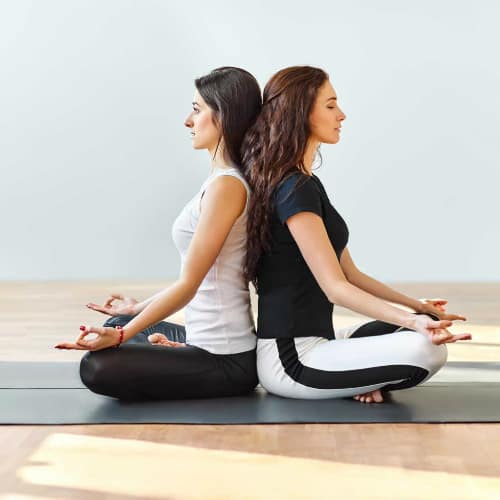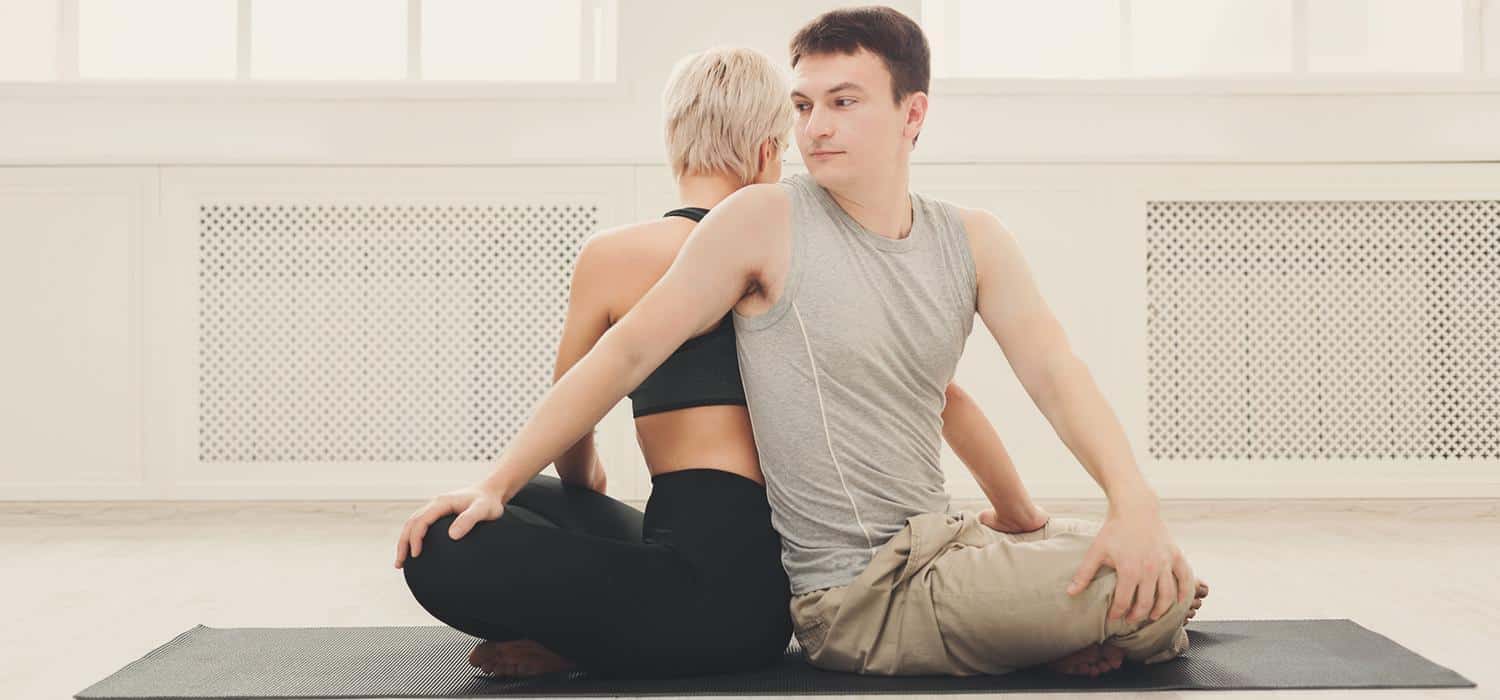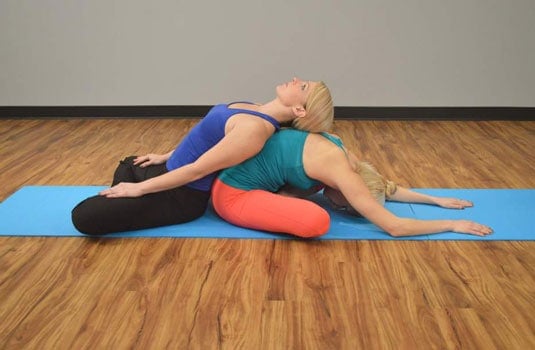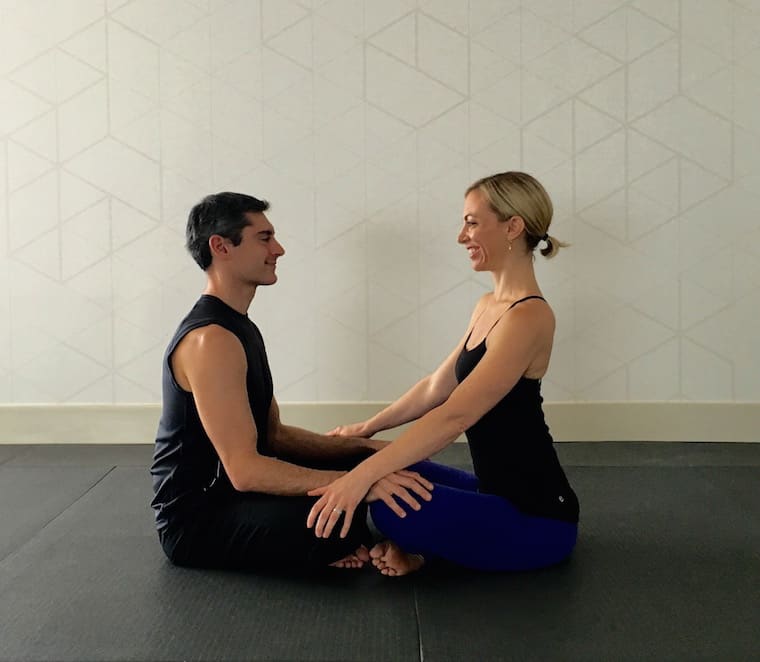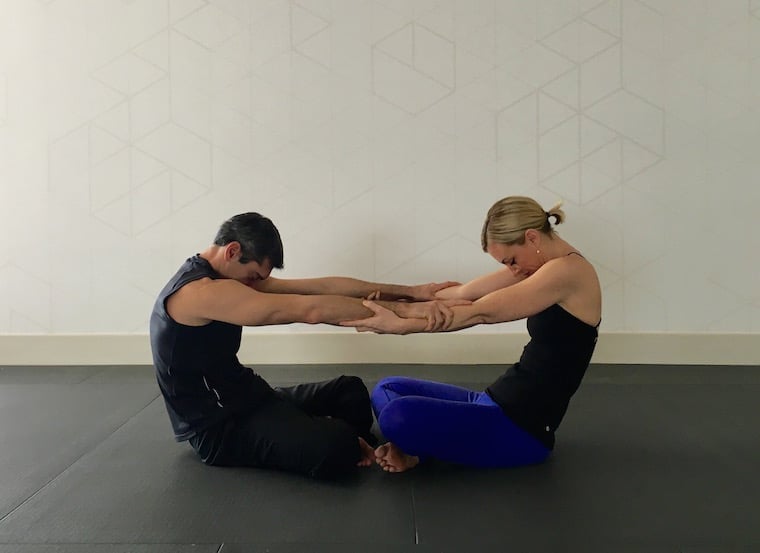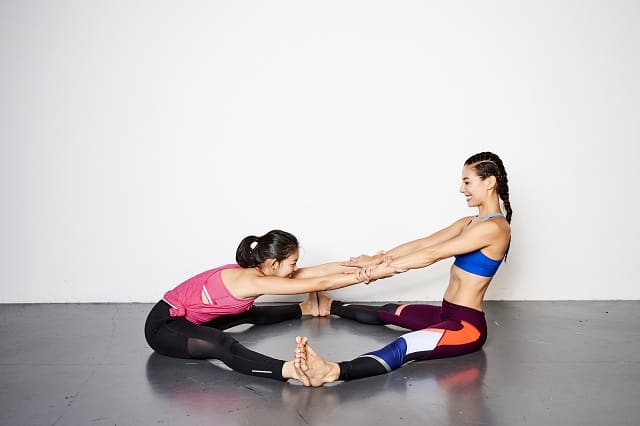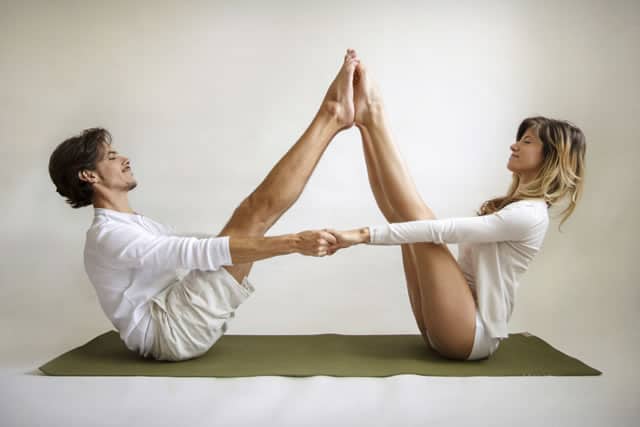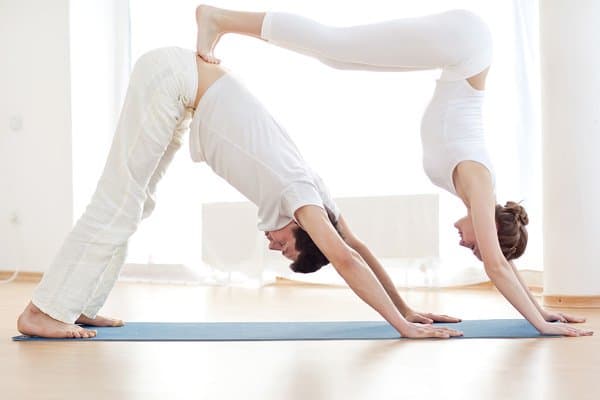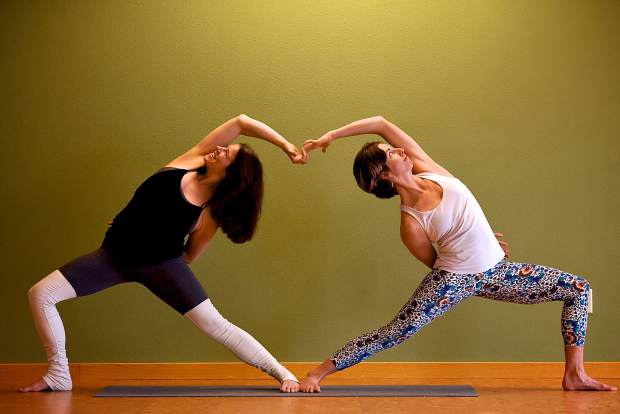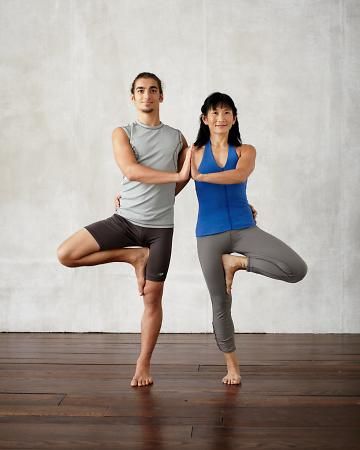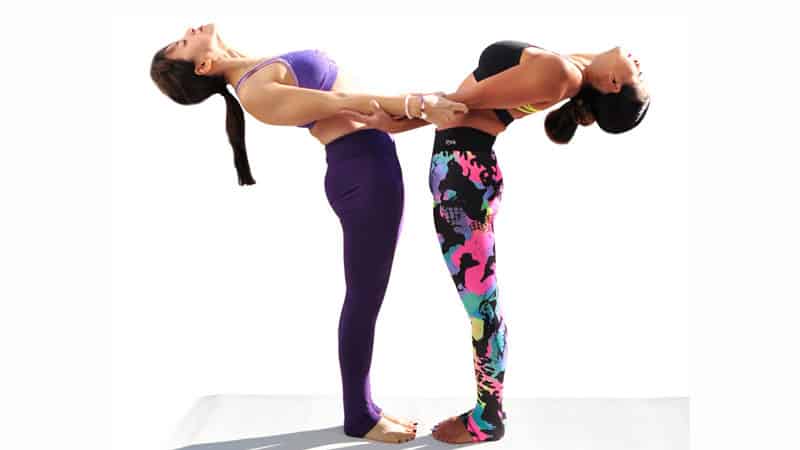Our partners are mirrors to our true self. By embracing a partner yoga practice with one another, we not only lean on each other for support – literally and metaphorically – but we also exercise our vulnerability with one another.
Science has found that by doing so, we’re strengthening our social connections and relationships, which leads to longer lives, healthier habits, reduced stress, and a deeper sense of life meaning.[1]
So how does yoga help with this exactly? In Sanskrit, “yoga” comes from the word yuj, meaning “to yoke” or “to unite”.[2] It’s only appropriate to mirror that definition with a partner, and in essence, begin to unite two people as a whole. Partner yoga also has its roots in building trust and communication, which are cornerstones of a healthy, intimate, and successful relationship.
Let’s break down some poses for a deeper dive:
1. Breathing Together
A great yoga practice begins with the breath. It’s a simple yet powerful way of connecting to your own body and noticing any sensations that arise.
Find a seated position with your partner, your backs touching. With eyes closed, tune into you breathing, and begin to deepen the inhales and the exhales.
You will feel the rise and fall of your partner’s breathing, as you tune into each other’s rhythms. See if you can still maintain your own breath, even when it becomes tempting to mirror the breathing of your partner; allow this rhythm to lull you deeper into becoming present and aware of each other’s space.
Even in unity, you honor your own body and breath, and that honor extends outward to your partner. With this life force – prana [3] – you’re able to find a richer connection to each other with a simple act of breathing.
Do this exercise for 3-5 minutes, or as long as it is comfortable.
2. Partner Twist
A twist is a great natural detox for the body. When the torso is twisted in the opposite direction, the movement acts as a wringing action for the internal organs, and via an exhale, built-up toxicity can be eliminated from the body.
With your backs touching, take a deep breath in. As you exhale, gently twist, going in the opposite direction of each other. Take one hand and place it on your opposite knee, with the other hand reaching back for your partner’s. Use a yoga strap if this is not available.
Allow the breathing to once again sync you with your partner’s rhythm, and notice what it’s like to have the support of your partner’s hand to help ease a little deeper into the twist.
Stay in the twist for 5 full breaths, and then switch sides.
3. Backbend/Forward Fold
While your backs are still touching, communicate who will fold forward and who will come into a backbend. You’ll have a chance to switch sides.
The person folding forward will reach their hands forward and either rest their forehead down on the mat, or place it on a block for support. The person doing a backbend will lean back on their partner’s back and open the front of their heart and chest. Breathe deeply here, and see if you can feel each other’s breaths again.
In yoga, the heart is thought of as the place in front and back of your chest, as it’s the same area opening. So in this pose, even though you’re doing the opposite move, your hearts are still connected. Think about how that translates to your relationship off the mat.
Stay in this pose for 5 full breaths, and switch when you’re both ready.
4. Soul Gazing
This exercise is deeply personal and nourishing, as you sit facing your partner, gently gazing into their eyes.
Rest your hands on their knees or in their hands, and allow them to do the same. This will further connect you with the power of touch. Once you’re settled (and the giggles have subsided from direct eye contact), begin to truly see your partner.
In the chaos of our days and weeks, we don’t often get the chance to sit down and take in the person with whom we share our life. Gently gaze and take in your partner’s features, uniqueness, and energy, and allow them to see you in return. Not only is this centering for the rest of your practice, it’s also deeply loving and compassionate.
Stay in this exercise for 5 minutes or longer, if you both feel tuned in.
5. Seated and Supported Cat/Cow
From a seated position, reach for your partner’s forearms and interlace.
As you inhale, arch your back and lift your heart to the sky, maybe even lifting the gaze to expose and open the throat. As you exhale, round the spine and pull back, using the resistance of each other’s arms as support, bringing the gaze inward toward your chest.
Repeat the movements 3-5 times, or as long as you feel comfortable.
Allow this support from your partner to begin to build trust and surrender, as well as communication. Speak out to what feels good in this pose, and ask your partner the same.
While the pose is done in tandem, your experience of it in your own body is going to vary. Take this time to share those sensations, and become curious of your partner’s.
6. Seated and Supported Forward Fold
In relationships, we know that we don’t have to do everything on our own. We have our best ally in our corner to help us out.
Likewise in this pose, come into a wide-legged seat with the soles of your feet touching. Reach the arms forward and interlace, and then take turns gently pulling one another closer past middle, using each other as resistance in this Forward Fold. Stay here for 5 full breaths each.
While this pose is a deep stretch, maybe opt for more of a playful approach! If laughter comes naturally or someone cracks a joke, go along!
Find fun in working out and being with one another. It’s a surefire way to relieve any stress or tension, and remind each other of the simpler things that bring you both some more smiles.
7. Partner Boat Pose
When it comes to postures that are challenging, having a partner mirroring and supporting you can go a long way to giving you that extra boost of confidence and energy. And because they’re doing it with you, too, you can both share in the achievement of rocking this core-engaging posture.
Start in a seated position, facing one another, a little further away to give enough room for extending the legs. When you’re ready, come into Boat pose one leg at a time, until the soles of your feet are touching.
Use them as resistance to further stabilize this pose. If available, reach for each other’s hands, and find each other’s gaze. Smile and breathe. Communicate how you’re feeling and root each other on for 5 full breaths.
8. Double Downward Dog
Speaking of building trust, this pose will give you and your partner a chance to work together toward a common goal. This pose is also all about communication, and speaking your mind when you’re ready to come down or are feeling a sensation that you’d like to share with your significant other.
With your partner in traditional Downward Dog, set yourself up by coming into a Forward Fold at the top of the mat. Lifting one foot at a time, place your feet at the base of your partner’s spine. You may need to adjust your feet or walk your hands back once you get into this, to readjust.
Once in the pose, breathe there for 5 full breaths, before you switch. After you come out, touch base on how it felt and what you experienced. Share in the pose together by bringing in your specific perspective.
9. Reverse Warrior Partner Pose
If it’s not evident from the photo above, this pose is all about creating love – literally and symbolically.
Begin in Warrior Two facing away from each other, with the outside of your back foot touching. Allow this back foot connection to unite you together in the pose, building a shared foundation from which you can stabilize.
Take a deep breath in, and on an exhale, come into your Reverse Warrior by lifting one arm overhead and reaching back for your partner’s grasp, creating a heart shape in the middle of your joined pose. Use a yoga strap if catching your partner’s hand is not available.
Take your other hand and wrap it behind your waist. Settle your attention on your breathing and press into your partner’s foot as they do the same. Likewise, mirror the support of their hand in yours.
The love you create in your relationship is a two-way street. Remind yourself of all the wonderful ways in which you give and take to build that love. Take 5 full breaths here, and then release when you’re both ready.
10. Double Tree Pose
No man is an island, and likewise, no tree thrives without support.
In this partner pose, begin in your own Tree, by lifting one leg and pressing the sole of the foot into the thigh or down lower on the calf.
When you’ve caught your balance, extend one hand to your partner’s and meet them, palms touching, in the center between your respective Tree postures. Take your other hand and reach it back behind your partner, giving them a loving embrace. Stay here for 5 full breaths before switching sides.
Even though your Tree pose is your own, find the center connection that brings you both together in unity.
Allow yourself to feel and appreciate the support you get from your partner, on and especially off the mat.
11. Standing Partner Backbend
Opening our hearts to each other is the most raw way of showing our vulnerability. That’s why this pose is so powerful in tandem. By using each other for support, you’re reassuring your partner that anything is possible (and better) when you have each other.
Start standing and facing each other, as you interlace each other’s forearms. Take a deep breath in as you hold each other’s gaze, and on an exhale, lean back to open your heart to the sky, using each other’s arms as resistance. Stay here for 5 full breaths, or as long as it’s comfortable for you both.
Release and end with a hug, honoring the space you’ve created for each other and yourself.
Final Thoughts
Partner yoga asks for vulnerability. Through the power of touch and synced breathing, we forge deeper and richer connections in our relationship with our partner.
The experiences we share together and individually in these yoga postures become topics of communication that can help us learn more about each other and ourselves, further growing our intimacy to heights never felt before.
Practice these poses with your partner whenever you are craving that bough of connection or intimacy. Challenge each other with postures that are both energizing and restorative, and tune into each other’s unique experiences for more wholesomeness in your relationship.
Reference
| [1] | ^ | Psych Alive: How Embracing Vulnerability Strengthens Our Relationships |
| [2] | ^ | Anada: The Yogic Encyclopedia |
| [3] | ^ | J Altern Complement Med. : Sudarshan Kriya yogic breathing in the treatment of stress, anxiety, and depression: part I-neurophysiologic model. |

